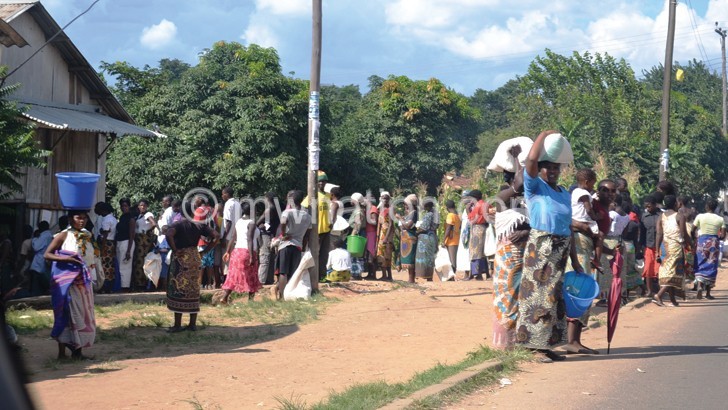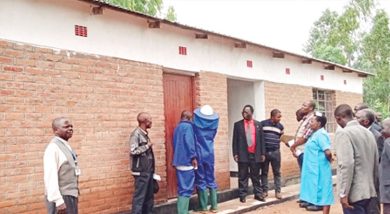Parastatals To parasites
Barely days after Treasury rejected an Escom bail-out request, an economics professor has tipped off government to nip corruption in the bud and set performance targets for executives to save State enterprises from collapse.
Ben Kaluwa, who teaches economics at Chancellor College, a constituent college of the University of Malawi, expressed the sentiments in an interview in the wake of government’s K45 billion bail-out of State produce trader Agricultural Development and Marketing Corporation (Admarc) and recent requests for K58 billion from Electricity Supply Corporation of Malawi (Escom) and Plant and Vehicle Hiring and Engineering Services (PVHES) which needs K2.5 billion recapitalisation.
He said: “This bail-out-seeking trend is likely to continue among State-owned companies that have been milked dry, initially by their own over-paid and wasteful executives and board members.
“This is very bad for our economy and the government must take a long and h

ard look at itself because it is causing this mess itself by tolerating incompetent and corrupt officials in parastatals.”
In separate telephone interviews, Minister of Finance, Economic Planning and Development Goodall Gondwe and new board chairperson for Escom Thom Mpinganjira hinted at the need for a shake-up in poor performing parastatals.
Mpinganjira said Escom will this afternoon hold a news conference in Blantyre to present an analysis by an audit firm on how the corporation switched from a profit maker in 2016 to the current state of being financially-crippled.
In his sentiments, Kaluwa stressed the need for government to cap salaries and the string of perks given to executive officers and board members, some of whom, he said, abuse other resources such as vehicles of their parastatals with both abandon and impunity.
Snce independence in 1964, virtually all parastatals have been actively involved in ferrying ruling party members to political events. Even though this off-side tradition has been exposed and condemned in the 24 years of post one-party era, no governing party has put a stop to it yet.
Kaluwa also observed that many of the parastatals have long outlived their usefulness because they are perennial loss-makers needing to be scrapped.
He said many technical pointers to why parastatals are largely a flop in Malawi are contained in a 1996 research carried out by Collin Lawson and himself titled The Genre of International Development 1996.
Said Kaluwa: “Most of the issues highlighted in the research paper are still relevant to date. Unless the government institutes a major shake-up in parastatals—with competent, results-oriented management members at the helm—these organisations will continue to be a public burden.”
He proposed that the government uses the public private partnership (PPP) business model in restructuring and resuscitating service-delivery and profit-making in parastatals.
Said Kaluwa: “We need to study and emulate best practices as shown by Ethiopian Airlines, for example. Where some airlines, including our own Air Malawi, collapsed, the government-owned Ethiopian Airlines soared because it consistently pushed for efficiency and excellence to the extent that it is now acclaimed as one of the best airlines in the world.”
Mpinganjira, on the other hand, regretted that inefficiencies, including bad procurement decisions, whittled away an K18 billion profit in 2016 and have now reduced Escom to a parastatal burdened with a deficit of over K50 billion.
In his comments, Gondwe shared Mpinganjira’s concern over Escom’s apparent mismanagement of finances.
He said: “Government will sit down with Escom to understand what really happened.”
However, the minister said while the Admarc bail-out is justified because the government was involved in authorising the parastatal to secure money from banks in response to a national food crisis, requests for bail-outs are a sign that the State-owned entities are failing to perform as expected.
He stated that the government will review the performance of the parastatals to make them more vibrant, mainly through results-oriented management.
But Gondwe noted that in neighbouring countries and “even in Britain, by the way,” parastatals have generally disappointed governments in their under-performance.
In an interview last week, Secretary to the Treasury Ben Botolo said Escom’s bail-out request had been rejected by the government because it was struggling with the budget distortion the Admarc bail-out had caused.
He said: “We cannot, therefore, go ahead and do the same to another institution. If we do that, we will start collapsing the economy because we don’t have that money.
“If we do that [the bail-out], it will force us to print money to that magnitude… The consequences might be huge if we take that path.”
Other parastatals, including Escom and the country’s five water boards, are also financially choked by unpaid bills from government ministries, departments and agencies (MDAs).
PVHES, for instance, said it is owed over K400 million by MDAs and was seeking K2.5 billion to get resuscitated. n




